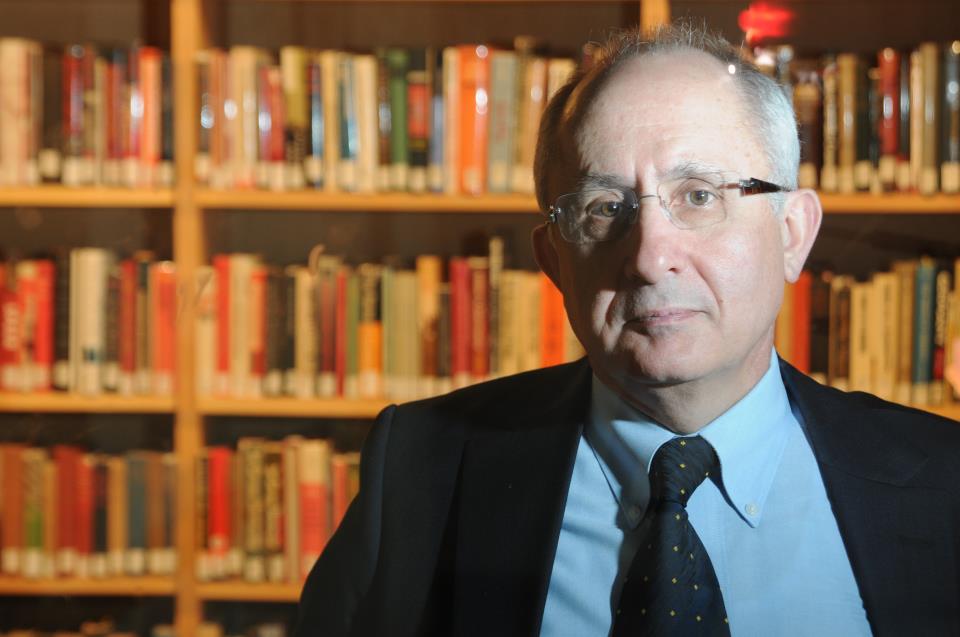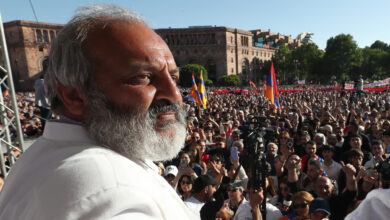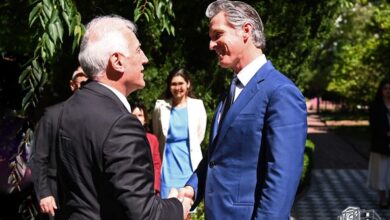

Turkish historian Taner Akcam has recently uncovered a telegram, which, he says, will force the Turkish government seek new ways of denying the Armenian Genocide.
“Are the Armenians who were deported from there being liquidated? Are the troublesome individuals whom you have reported as having been exiled and expelled being exterminated or merely being sent off and deported? Please report back honestly,” reads the telegram sent from Ezrum by Behaeddin Shakir to Kharberd Governor Sabit Bey.
The document dated July 4th, 1915 consists of two parts – the actual text on top and the coded four-digit Arabic numbers on the bottom.
Taner Akcam, a history professor at Clark University in Massachusetts, says the telegram is important for two reasons. “First, it is written on a paper with the letterhead of the Ottoman Ministry of Interior. Second, separate from the text there is a decoded message on the bottom,” he said in a phone interview with Public Radio of Armenia.
The historian has compared the coding system with that of other documents from Ottoman archives and found matches with 24 documents from the same month. The same words are coded the same way. “So there is no escape for Turkish authorities, there is no way to say these are forgeries. And this is a very crucial document in that sense,” Akcam said.
This telegram is well known in Armenian Genocide research and has been quoted in main indictments in Istanbul military tribunals. This was one of the most important evidences that helped convict Behaeddin Shakir and sentence him to death. However, most of the court materials vanished at the time and Turkey has since been building its policy of denial on the argument that the original documents from postwar military tribunals that convicted the genocide’s planners were nowhere to be found.
Taner Akcam knew the telegram was in a the archive of the Armenian Patriarchate of Jerusalem , but in the end found a film taken from the document in a private archive in New York. Thus, two stories need to be recalled to shed light on how the photo of the telegram ended up in the United States.
The Armenian Patriarch of Constantinople was representing Armenians in military tribunals and had access to the court materials. The judge presiding over the tribunals at the time handed the materials over to the Armenian Patriarch. With the Turkish nationalists about to seize the country in 1922 the Patriarch shipped a huge package of documents to Marseille and then to Manchester for safekeeping. The materials finally ended up in Jerusalem.
“Armenian Catholic priest, Krikor Guerguerian went to Jerusalem sometimes towards the end of 1960s. He filmed the materials there and a lot of other Ottoman documents one of which was this document. He had a private archive, which was saved and secured by his nephew,” Taner Akcham said.
Despite the crucial importance of the document, the historian does not believe it will lead to changes in Turkey’s stance on the issue in the short-term perspective.
I’ve thrown a stone in the water, and waves go to the shore, it takes a long time until they hit the shore. The shore is the Turkish denialism. I don’t know when it’s going to hit the shore
Taner Akcam
According to the historian, the telegram is a strong evidence Ankara can hardly argue, but he’s confident that Turkey will find some excuses. He’s also confident that “Turkey will continue its denialist policy, but this will put the government in a very difficult position and will force it seek new ways of denying.”
Towards the end of the interview, Mr. Akcam emphasized one point. “As everybody knows successive Turkish governments would argue all the time that Armenian Genocide should not be politicized, that the Armenian Genocide should be left to historians. And I’m just really doing it. I’m a historian and regardless of the fact whether the Turkish government recognizes the genocide or not, I keep working on this topic, because as scholars, as academicians our job is to teach the young generation about the historic injustices, about mass atrocities in the past so that they are not repeated in the future.”
Taner Akcam believes that “it’s important for Turkey to face its history.” If Turkey faces its history and acknowledges the wrongdoing, it can develop a very good relation with Armenia and develop a democratic society,” he says.








